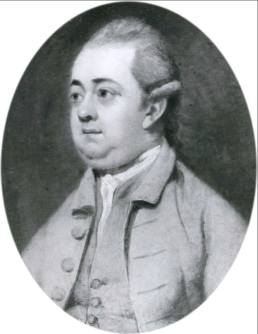These life stories may contain descriptions of childhood trauma and abuse, as well as images, voices and names of people now deceased. If you need help, you can find contact details for some relevant support services on our support page.
Prominent English historian, Edward Gibbon (1737-1794), was in kinship care and foster care as a child.
Edward Gibbon was born in Putney, Surrey, the eldest son of Judith Porten and Edward Gibbon. The couple had six more children, but all of them died in infancy. The consequences for Edward of his mother’s frequent pregnancies and general disinterest in him was that his aunt, Catherine Porten, was his primary carer. He wrote of his appreciation of and fondness for his aunt in his Autobiography:
Many anxious and solitary days did she consume in the patient trial of every mode of relief and amusement. Many wakeful nights did she sit by my bedside in trebling expectation that each hour would be my last (Gibbon).
Edward’s formal education was often interrupted by his ill health, but when he was nine years of age, his father sent Edward to boarding school, which he recalled as being a difficult time.
At the end of 1747, Edward was called back home on the death of his mother. His grief-stricken father withdrew from society to a home in Buriton and young Edward lived with his maternal grandfather, James Porten, and his aunt Catherine in Putney for twelve months. After his grandfather lost his money and home, Catherine set up a boarding house for boys attending Westminster School. At first, Edward was the only child living in the boarding house but it gradually became a success.
By September of 1750, however, Catherine Porten was obligated to seek different care for Edward who was frequently ill and absent from school. He stayed first with a servant at Bath for some months, and then with a medical professional in Winchester. Eventually Edward recovered sufficiently to live with a Reverend Mr Philip Francis at Esher in Surrey before his father sent him to Oxford University at age fifteen.
In 1753, sixteen-year-old Edward Gibbon converted to Catholicism. His father’s reaction was one of alarm as being a Roman Catholic would limit his son’s opportunities—he could not become a Member of Parliament, be employed in any public office, and there would have been restrictions on how much of his inheritance he could receive. Edward Senior first sent his son to live with a friend in England but only three weeks later, sent him to live with a Calvinist Pastor, Daniel Pavillard, in Lausanne, Switzerland. The boy converted to Protestantism eighteen months later.
Edward Gibbon stayed living with Daniel Pavillard in Lausanne for almost five years. He was positively influenced by Pavillard to expand his knowledge and learn French, and he took up an interest in history.
Gibbon returned to England as he was about to turn twenty-one and began on several historical projects, which were interrupted between 1760 and 1762 by his service with the Hampshire militia. It was during a visit to Rome in 1764 that he decided to write a history of that city, and later, of the Roman Empire.
After his father died in 1770, Gibbon settled down to the work for which he is best known, The History of the Decline and Fall of the Roman Empire which covered thirteen centuries, beginning in the second century CE and going through until 1453. The first volume was published in February 1776 to resounding success. The second and third volumes were published in 1781, and the final one in 1788.
In 2017, The Decline and Fall of the Roman Empire was declared by The Guardian as the 83rd of 100 best nonfiction books of all time. It is, writes Robert McCrum, “…a work of universal interest, and timeless influence, unquestionably a magnificent classic of our literature.”
References:
“Edward Gibbon”. BBC Radio 4 In Our Time, 2021. https://www.bbc.co.uk/programmes/m000x0v2
Gibbon, Edward. The Autobiography of Edward Gibbon Introduction by Oliphant Smeaton. Liberty Fund Network, 1911. https://oll.libertyfund.org/title/smeaton-autobiography#lf1478_head_003
Low, David Morrice. “Edward Gibbon. British historian”. Britannica, 2021. https://www.britannica.com/biography/Edward-Gibbon
McCrum, Robert. “The 100 best nonfiction books: No 83-The History of the Decline and Fall of the Roban Empire by Edward Gibbon (1776-1788)”. The Guardian, 4 September 2017. https://www.theguardian.com/books/2017/sep/04/100-best-nonfiction-books-decline-and-fall-of-the-roman-empire-edward-gibbon
Image available here.
